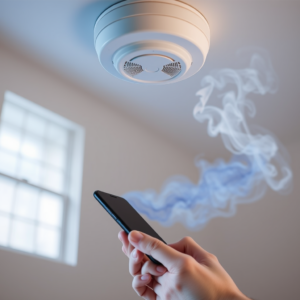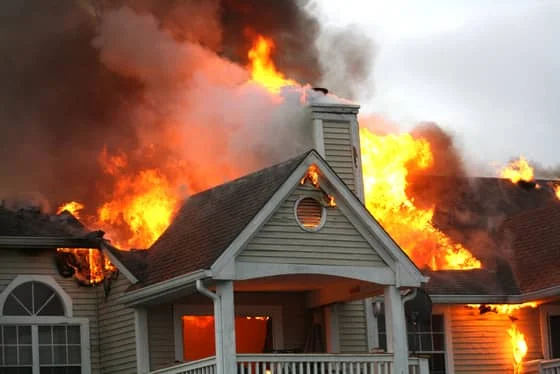Smoke alarms are silent sentinels in our homes, standing guard to alert us to the dangers of fire. They play a critical role in safeguarding our loved ones and our property. However, like any device, they require regular maintenance to function effectively. A crucial aspect of this maintenance is recognizing and adhering to the smoke alarm expiry date. Ignoring this date can lead to dire consequences that compromise safety, and potentially result in the challenges of selling a fire-damaged house.
In this post, we aim to investigate the subtle risks associated with overlooking the expiration dates of smoke alarms. We will clarify why these dates are crucial, the potential consequences of neglecting them, and propose practical solutions to enhance the safety of your living environment.
Understanding Smoke Alarm Expiry Dates
What Is a Smoke Alarm Expiry Date?

The inclusion of expiry dates by manufacturers acts as a safety protocol. It highlights that while your smoke alarm may appear to be functioning, its reliability could be compromised after a certain time. Regularly inspecting and adhering to this date is important for ensuring a secure household.
Technology Degradation Over Time
Each smoke alarm contains a detailed network of sensors and technological elements aimed at smoke particle detection. Prolonged exposure to environmental influences, such as dust accumulation, humidity levels, and temperature changes, can result in deterioration. These factors can affect the components. This deterioration adversely affects the sensor’s ability to detect smoke accurately, thus increasing the risk of operational failure.
The gradual decline in sensor precision is normal, yet it emphasizes the critical need for smoke alarm replacement. By undertaking this measure, you ensure that your home is equipped with devices that can issue timely warnings in the case of a fire.
Potential Risks of Ignoring Expiry Dates
Malfunctioning Alarms
Disregarding the expiration date of a smoke alarm can result in malfunctioning devices. Alarms that have surpassed their expiration may not effectively detect smoke due to degraded sensors. Consider the implications of depending on an alarm that fails to activate in critical moments. This situation occurs more frequently than one might assume.
Data indicates that a considerable proportion of smoke alarm malfunctions arise from units that have surpassed their expiration dates. Such failures compromise the essential function of smoke alarms within residential settings. This risk can be effectively reduced by observing expiration dates and ensuring the timely replacement of outdated devices.
Increased Fire Hazards
The failure to heed the expiration dates of smoke alarms carries implications that reach beyond basic malfunction. Alarms that do not function can result in undetected fires, thus elevating the risks of property loss and, more significantly, the threat to human life. One faulty alarm can ignite a series of dangers that put the safety of a whole household or structure at risk.
The inability of smoke alarms to alert inhabitants to a fire can lead to a loss of vital time. This lapse can differentiate between a minor occurrence and a severe calamity. By consistently maintaining and replacing smoke alarms as necessary, you can decrease the fire risks that jeopardize your household.
Legal and Insurance Implications
In addition to concerns regarding personal safety, neglecting the expiration dates of smoke alarms may lead to legal and insurance ramifications. Numerous jurisdictions enforce regulations that require operational smoke alarms in residential settings. Noncompliance with these regulations could result in legal liabilities.
Moreover, insurance claims associated with fire damage could be influenced by smoke alarms that are not functioning correctly. Insurance firms may regard expired alarms as negligence, possibly impacting the level of coverage and compensation provided. To protect oneself from such complications, it is crucial to ensure that smoke alarms are maintained and updated.
Practical Advice for Maintaining Smoke Alarms
Checking Expiry Dates
Regularly monitoring the expiry dates of your smoke alarms is a simple yet significant undertaking. The guide below will help you execute this task accurately.
-
Locate the Expiry Date: Most smoke detectors have the expiration date marked either on their back or side. If you are in doubt, you should look at the user manual for additional guidance.
-
Mark Your Calendar: Once you’ve identified the expiry date, record it on your calendar. Remember to set up reminders to test your smoke alarms at least once a year.
-
Stay Informed: Keep track of when your alarms were installed and when they need replacement. This proactive approach ensures you’re never caught off guard by an expired unit.
Replacing Expired Smoke Alarms
When it’s time to replace your smoke alarms, consider the following tips:
-
Choose Quality Alarms: Invest in reputable brands known for producing reliable smoke alarms. Look for features such as long battery life and advanced detection technology.
-
Professional Installation: While DIY installation remains an alternative, opting for professional installation guarantees that your alarms are appropriately situated and function effectively. This is particularly important should you have uncertainties about the installation process.
-
Stay Current: Stay informed about the latest developments in smoke alarm technology. The latest smoke alarms incorporate superior features like wireless functionality and smartphone alerts, which can significantly enhance your home’s protective measures.
Conclusion
In closing, the expiry date of smoke alarms is a significant factor in ensuring home safety that should never be ignored. Malfunctioning alarms, increased fire risk, and potential legal issues highlight the need for regular maintenance and replacement. By appreciating the importance of these expiration dates and taking proactive steps to care for your smoke alarms, you are actively protecting your family and your property from harm. This vigilance can also help you avoid the challenges of selling a fire-damaged house.
Do not overlook safety—make it your foremost concern by routinely checking the smoke alarm expiry date and replacing them when necessary. For comprehensive information regarding smoke alarm upkeep and home safety matters, consider engaging with local fire safety experts or organizations in your area. By staying informed and proactive, you will help safeguard your home for the foreseeable future.

